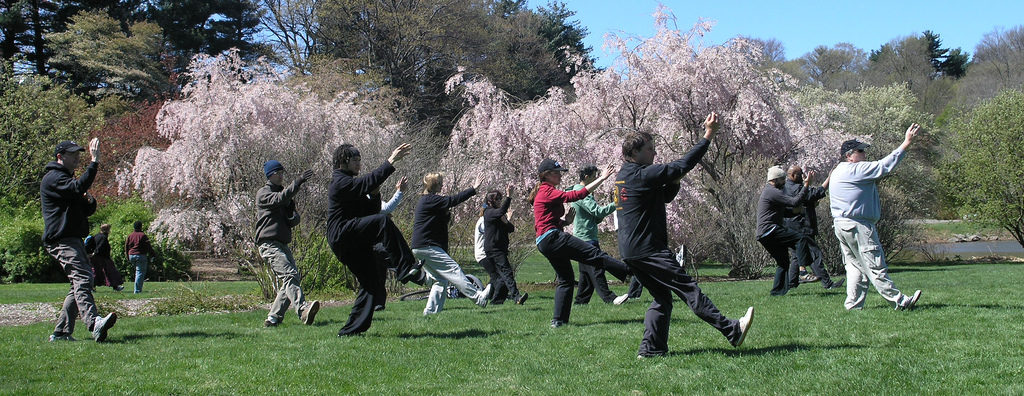Authors of a new study published in the journal BMJ Open examined the feasibility of a Tai Chi introductory group for veterans diagnosed with post-traumatic stress disorder (PTSD). The group of Boston-based researchers found that veterans who participated in the study felt satisfied with the group as an alternative treatment, and perceived that Tai Chi helped reduce some of their PTSD-related symptoms.
“Veterans indicated that the programme helped with several symptoms, such as intrusive symptoms, concentration difficulties and physiological arousal. In the open-ended interviews, several participants spoke of feeling unusually focused during the Tai Chi sessions and feeling calmed during and after sessions.”

According to the U.S. Department of Veterans Affairs, approximately 7 or 8 out of every 100 individuals in the U.S. will have PTSD during their lifetime. For veterans, the rates are higher given their experiences in combat, military sexual trauma, and other stress factors. For veterans exposed to recent conflicts, such as those related to the Iraq war, the prevalence goes up to 23%. The symptoms of PTSD are numerous and are associated with a decrease in physical and psychological functioning and well-being. Other associated issues with PTSD include problems in relationships and with employment, as well as substance abuse.
The authors of this article highlight the challenges and limitations of current PTSD treatments. Although some have proven efficacy they also suffer from issues such as high dropout and non-response rates, as well as issues of stigma related to traditional mental health approaches, such as talk therapy. Over 30% of individuals diagnosed with PTSD have been using complementary and alternative treatments and some research conducted regarding alternative and complementary treatments (e.g. yoga and mindfulness) for PTSD have yielded positive results.
Tai Chi, a traditional Chinese form of exercise which consists of slow, gentle movements and deep breathing, has been found to be beneficial in the treatment of sleep issues, depression, and chronic pain. These slow, deliberate movements coupled with mindful breathing, the researchers hypothesize, could positively impact the hyperarousal symptoms related to PTSD. For this study, the researchers aimed to examine participant reactions, as well as the characteristics, adherence, adverse events, and satisfaction in regards the Tai Chi intervention.
For this study, the researchers recruited 17 veterans with PTSD symptoms, including those who met diagnosis criteria, and those who had subthreshold symptoms. Individuals with active substance dependence, certain severe psychological indications (e.g. active suicidality, psychosis), recent hospitalization, and current participation in another PTSD intervention were not able to take part in the study. The four-session intervention was shorter than a traditional Tai Chi program (i.e. 24 or more sessions). The first session lasted 90 minutes, while the rest ran for 60 minutes. Participants were encouraged to practice what they learned on a daily basis. After the final session, individuals were asked to participate in satisfaction questionnaires, focus groups, and individual interviews.
The results were overwhelmingly positive with no adverse events reported, and 93.8% of veterans reported “that they were very or mostly satisfied with the four-session programme, that they were satisfied with ‘the amount of help they received’, and that they would rate the ‘quality of the programme’ as excellent or good.” In questionnaires, groups, and individual interviews participants reported being highly satisfied with the intervention, and that it had helped with managing a number of PTSD symptoms, including intrusive symptoms, physiological arousal symptoms, problems concentrating.
Some of the larger limitations identified by the authors included small sample size, selection bias, and brevity of the intervention. However, this article presented the first study examining the feasibility, satisfaction, and feedback of a Tai Chi intervention with veterans with PTSD, and their results provide support for the exercise as an alternative or complement to the currently offered treatments. “Given these positive findings”, the researchers write, “additional research is needed to empirically evaluate Tai Chi as a treatment for symptoms of PTSD.”
****
Niles, B. L., Mori, D. L., Polizzi, C. P., Kaiser, A. P., Ledoux, A. M., Wang, C., & Li, B. M. D. (2016). Feasibility, qualitative findings and satisfaction of a brief Tai Chi mind–body programme for veterans with post-traumatic stress symptoms. BMJ Open, 6(11), e012464. (Full Text)















Strictly speaking, Tai Chi is NOT “exercise”. It’s a way of learning to work with CHI. To move chi. One basic definition of “chi” is the electrical/chemical/physical energy of our nerves and muscles. PTSD will respond nicely to Tai Chi. It shouldn’t take more “research” to learn that *YES*, Tai Chi will help anybody with PTSD. We need more Tai Chi instructors. And a lot fewer psychiatrists…. The ideal number of psychs would be *NONE*….
Report comment
I joined a T’ai Chi group and also a Qi Gong group (the individual exercises which make up T’ai Chi, the dance) as a basic feature of my healing from psych drugs toxicity and post “mental health” system traumatic stress, and it is fantastic on so many levels, truly holistic healing. Balances energy on all levels–physical, mental, emotional, it is grounding, quiets the mind, clears blocks, integrates masculine/feminine energies (yin/yang), etc. By amplifying our chi, we regenerate our cells and core energy, to kick in self-healing. I ended up integrating Qi Gong as part of my lifestyle, 15 minutes in the morning, and I teach it as part of my healing practice. It is extremely gentle and healthful maintenance.
Report comment